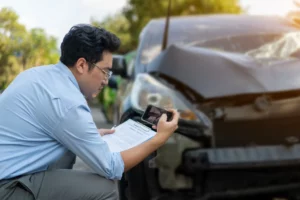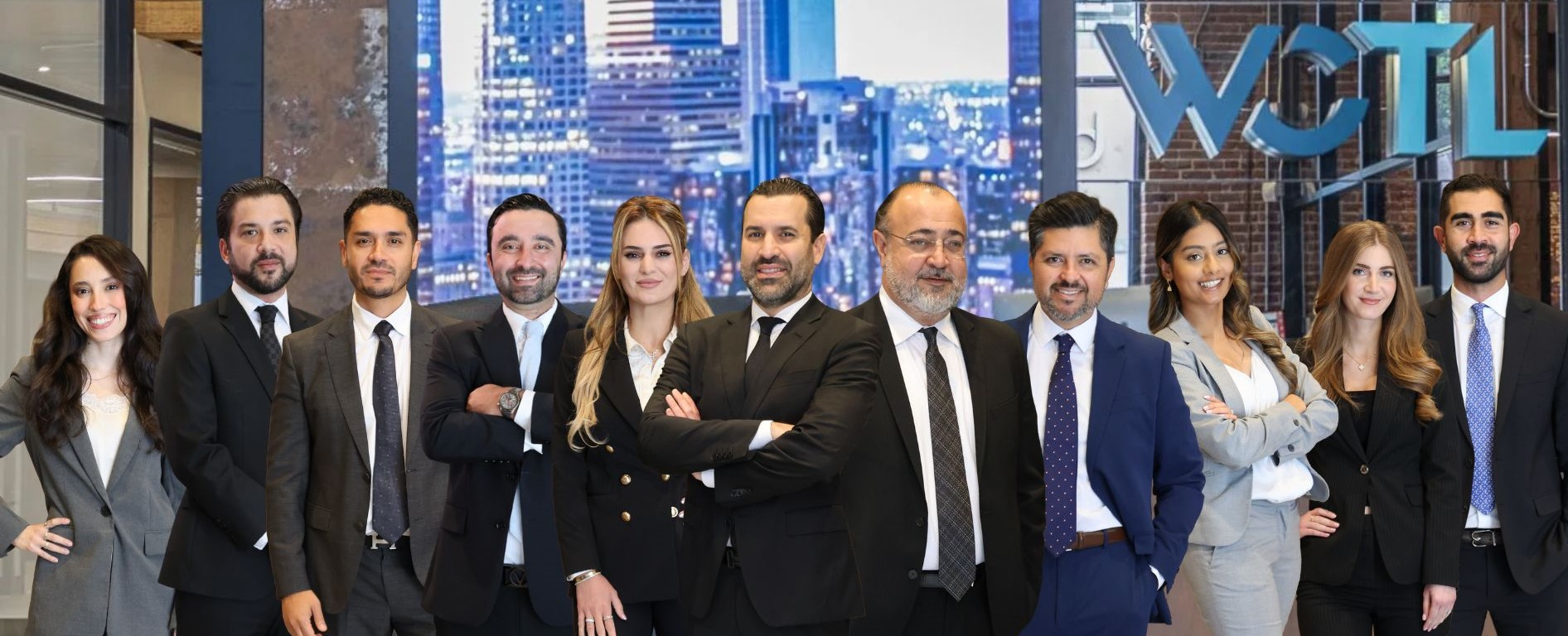Uber and Lyft have revolutionized the way we travel, giving us a more convenient and affordable alternative to traditional taxi services. However, the risk of accidents and injuries remains the same–if not greater due to the distraction of having to read a map–and that’s where our expert California Uber and Lyft accident lawyers come in to help.
As the demand for rideshare services increase, accidents involving Uber and Lyft vehicles are becoming more common, leaving passengers, drivers, and other motorists vulnerable to serious injuries.
If you are dealing with injuries and damages as a result of a rideshare accident, it may be confusing and overwhelming to handle these issues along with legal complexities surrounding the collision. At West Coast Trial Lawyers, our expert Uber and Lyft accident lawyers will fight tirelessly on your behalf to ensure you recover compensation for the losses you incurred.
To schedule a FREE consultation, please contact us by calling (213) 927-3700 or completing our quick online contact form. We are available 24/7 to answer phone calls and form submissions.
How an Uber and Lyft Accident Lawyer Can Help You
An Uber and Lyft accident attorney specializes in handling rideshare accident cases, meaning that they understand what unique issues can be associated with such an event. If you are wondering just how important it is to hire a legal representative who has expertise and knowledge in these types of situations, you can take a look at the following benefits that come with their services:
- Investigate the accident: An experienced lawyer will investigate the accident to determine who is at fault. They will gather evidence such as witness statements, police reports, and surveillance footage to build a strong case.
- Negotiate with insurance companies: Uber and Lyft have insurance policies that cover accidents involving their drivers. However, dealing with insurance companies can be complicated, and they may try to offer you a low settlement. An Uber and Lyft accident lawyer can negotiate with the insurance company on your behalf to ensure that you receive fair compensation.
- Determine liability: Liability in Uber and Lyft accidents can be complex. Depending on the circumstances of the incident, the driver, the rideshare company, or a third party may be liable. An experienced lawyer can help determine the responsible party and hold them accountable for their negligence.
- Identify damages: In addition to medical bills and property damage, you may be entitled to other damages, like lost wages, pain and suffering, and emotional distress. An Uber and Lyft accident attorney can help determine the full extent of losses you incurred and ensure that you receive maximum compensation.
- Represent you in court: If the insurance company refuses to offer a fair settlement, your accident lawyer can represent you in court. They will be able to present your case to a judge and jury and fight for your rights.
Common Injuries in an Uber or Lyft Accident
In an Uber or Lyft accident, the extent of bodily harm will depend on the intensity of the impact. Some common injuries that typically appear in auto accidents include the following:
- Whiplash
- Back injuries
- Head injuries
- Soft tissue injuries
- Bone fractures
- Burn Injuries
- Loss of limb/amputation
- Internal bleeding
- Paralysis
Uber and Lyft Insurance Coverage
Due to the amount of drivers rideshare companies like Uber and Lyft employ, they have insurance policies that cover accidents involving their drivers, but the coverage can be complex and vary depending on the circumstances of the collision. In fact, the insurance coverage can be categorized as one of three scenarios:
- Offline: If a rideshare driver gets into an accident when they are offline, they have to use their personal auto insurance to cover any injuries and damages that have occurred.
- Online and Available for a Trip: If a rideshare driver is at fault and another individual gets harmed or sustains vehicle damage, third-party liability coverage may apply in at least the following amounts: $50,000 per individual, $100,000 per collision, and $25,000 in property damage.
- Offline and En Route or on a Trip: At least $1,000,000 for property damage and injuries may apply in a collision where a rideshare driver is at fault. In addition, if their car is damaged, they will receive coverage up to its actual cash value (with a $2,500 deductible). But, they will need to have comprehensive and collision insurance in their personal auto policy for this to be effective.
The Importance of Finding a Local Rideshare Accident Lawyer in California
Hiring a local lawyer comes with many benefits that can ultimately make a significant difference to your Uber and Lyft accident case. Such legal representatives are familiar with specific rules and regulations enforced in your area, and have a good understanding of what unique challenges may be presented. In addition, it will be easier to schedule in-person meetings due to close proximity. This means that your travel time will be cut short and time zones will be similar, making it convenient to arrange plans to discuss your lawsuit.
Here are some other benefits you can get of working with a local rideshare accident lawyer:
- In-depth knowledge of local laws: Each city in California has its own nuances when it comes to handling Uber and Lyft accidents, from traffic patterns, court procedures, to even determining liability.
- Familiarity with local courts and judges: A local attorney knows the preferences and tendencies of judges and other legal professionals in the area.
- Accessibility and personalized service: Meeting your attorney in person can provide peace of mind and foster clear communication throughout the process.
If you’re looking for an experienced local Uber and Lyft accident lawyer, we proudly serve clients in cities across California. Explore the links below to find help in your area:
- Los Angeles
- San Francisco
- San Diego
- San Jose
- Sacramento
- Fresno
- Long Beach
- Santa Ana
- Riverside
- Irvine
- Bakersfield
- Beverly Hills
- Pasadena
- San Bernardino
- Woodland Hills
- Solana Beach
- Newport Beach
- Glendora
- Valencia
- Fullerton
- Visalia
- Palm Springs
- West Covina
By choosing a lawyer who knows your city, you’ll receive the tailored support and legal guidance you need to achieve the best possible outcome for your claim. Don’t settle for generic legal representation—work with someone who understands the unique challenges and opportunities in your local area.
Determining Liability in an Uber or Lyft Accident
According to California law, Uber and Lyft are classified as transportation network companies (TNC), which means riders who use their services are typically covered under commercial liability coverage. However, determining liability in an Uber or Lyft accident is based on the amount of negligence contributed by all parties involved.
Under California’s pure comparative negligence rule, all parties involved will be evaluated to identify the percentage of fault. So, even if you are partially responsible for the rideshare accident, you can still recover damages but it will be adjusted according to your level of accountability. For instance, if you are 20 percent at fault and the total damages are $80,000, you will be left with an estimate of $64,000.
As rideshare drivers are required to provide a duty of care, they must follow all traffic laws to maintain a safe environment for others. If they breach this duty of care, then the rideshare driver will be held liable for damages, not the rideshare company. This is due to Proposition 22, which classifies rideshare drivers as independent contractors instead of employees, and as a result, rideshare companies typically cannot be held liable for any accidents caused by their drivers, making it difficult for victims to pursue a personal injury claim against them in the event of an accident.
How Long Can I Sue for Damages?
In California, the statute of limitations to file a personal injury lawsuit is generally two years from the date of when the incident occurred. This means that you have a specific duration of time available to initiate a claim against the responsible party to recover damages.
If you are injured in an Uber or Lyft accident, It’s important to note that the time limit will begin on the initial date of when the event took place. And If you miss the deadline, you may lose your right to secure compensation. Your case will also be dismissed. So, be sure to take legal action as soon as possible.
Available Damages in a Rideshare Accident Case
If you have gotten hurt in an Uber or Lyft accident, you have the option to recuperate some of your losses and damages. However, the value of each damage will vary depending on the nature and severity of the accident.
- Clinical Costs: You can sue for the expense of clinical treatments in connection with your wounds, medicine, trauma visits, medical procedures and checkups.
- Loss of Income: If you cannot show up to work due to an Uber and Lyft accident, you are entitled to sue for lost wages.
- Emotional Distress: You are permitted to sue for emotional distress and misery associated with mishaps resulting from the collision
- Property Destruction: Assuming your vehicle or other property was damaged in the accident, you are entitled to sue for the cost of fixing or replacing the damaged property.
- Punitive damages: In rare cases, you may have the option to sue for punitive damages, which are expected to punish the party responsible for the Uber and Lyft accident.
If you want to assess how much damages you can recover for your rideshare accident, you can either input your information in a Personal Injury Settlement Calculator or consult with an experienced accident attorney.
Should I See a Doctor After an Uber or Lyft Accident?
It is always a good idea to see a doctor after an Uber or Lyft accident, even if you don’t feel any injuries at the time. Here’s why:
- Some injuries may not be immediately apparent: Some injuries, such as whiplash, concussion, or soft tissue injuries, may not show symptoms right away. By seeing a doctor after an accident, you can ensure that any injuries are identified and treated early on.
- Documentation for insurance purposes: If you decide to file an insurance claim or lawsuit, documentation of any injuries can help you get the compensation you deserve. Seeing a doctor creates an official record of your injuries that can be used as evidence in your case.
- Peace of mind: Even if you don’t have any visible injuries, seeing a doctor can provide peace of mind that you are okay. This can be especially important if you have any underlying medical conditions that could be exacerbated by the accident.
What To Do If You Have Been Involved in an Uber or Lyft Accident?
Getting involved in a rideshare accident can become a very distressing experience, however, no matter how you have gotten involved in an Uber or Lyft accident, it is imperative that you take the necessary actions in order to secure everyone’s safety and to protect your legal rights. As rideshare accidents are a form of car accidents, the process of handling one in the event of an accident is generally the same. However, there are some extra things you should watch out for depending on the scenario.
Getting in an Accident Driving for Uber or Lyft
If you are driving for Uber or Lyft and have got into an accident, it is important to stay calm and follow these important steps to prevent the situation from getting worse.
- Make sure to check for any signs of injuries and call 911 if there are any.
- Contact the police to ensure an official report of the accident is recorded.
- Contact Uber or Lyft to report the accident as well as any other relevant information pertaining to it.
- Document the accident by taking photos, videos, notes or anything that will help paint a clear and vivid image of the accident for future recounting.
- Contact an experienced Uber and Lyft accident attorney that will help you understand your rights in the case and fight for you.
If Your Uber or Lyft Driver Gets in an Accident
If you’re a passenger in an Uber or Lyft accident, the first priority is to make sure that everyone is safe and if anybody requires immediate medical attention, call 911 immediately. While you wait, it is recommended to try and find out how the accident happened and document as much information as possible in order to prove liability.
Hitting an Uber or Lyft Driver
Hitting a rideshare vehicle can be quite a complicated situation. If you hit an Uber or Lyft driver, the driver may be able to sue and claim damages if they are able to prove that the accident was caused as a result of your negligent behavior. Negligent behavior can be classified as any situation where an individual acts carelessly, for example, distracted driving, running red lights, speeding, drunk driving, aggressive driving, and tailgating are all instances of negligent driving.
If the Uber or Lyft driver was at fault or the cause of the accident, then you may be able to file a claim with their insurance company. Regardless of who is at fault, remember to seek emergency services first, if needed.
West Coast Trial Lawyers Is Here to Help
If you have sustained injuries as a result of someone’s negligence, you have the right to hold them responsible for your losses. At West Coast Trial Lawyers, our California Uber and Lyft Accident attorneys are readily available to assist. We can evaluate your case, identify the at fault party, and pursue legal action on your behalf to make sure you get the compensation you deserve.
With over $1.7 billion of financial compensation recovered for our clients, our knowledgeable California Uber and Lyft accident lawyers have a proven track record of securing compensation and representing our clients best interest. Whether you were injured in a rideshare accident as a passenger or as a driver, we will work tirelessly and advocate on your behalf to get you the best outcome possible.
To schedule a FREE consultation, you can reach out to us by calling (213) 927-3700 or filling out our easy online contact form.
Frequently Asked Questions About Uber and Lyft Accidents
Can I File a Claim if the Uber or Lyft Driver Was Off-Duty?
Since Uber and Lyft do not cover offline rideshare accidents, you will need to file a claim with the driver’s personal auto insurance company. But, if the driver was on their way to fulfill a ride request, there could be some legal challenges in terms of insurance coverage. Given the circumstances, you can present your case to our Uber and Lyft accident lawyers for legal guidance and support.
How Is Compensation Calculated in an Uber or Lyft Accident?
Each Uber and Lyft accident case will involve unique circumstances that can affect the outcome of your settlement value. Typically, the following factors will be considered when calculating and distributing compensation:
- The severity of your injury
- Degree of fault
- Current and future medical expenses
- Lost wages and earning capacity
To get an estimate of what you could be entitled to, you can use our personal injury settlement calculator by inputting the losses you incurred as a result of the Uber or Lyft accident.
Do I Need a Lawyer for a Rideshare Accident?
You are not required to have a lawyer to pursue a rideshare accident lawsuit. But, having one can make it convenient for you to undergo a complicated legal process without added stress. At West Coast Trial Lawyers, our team can perform tasks on your behalf to ensure you have a higher chance at acquiring a fair settlement. This includes doing the following:
- Assess your case
- Determine liability
- Negotiate with insurance companies
- Maximize compensation for losses you endured
- Represent you in court if your case heads to trial
If you are met with low settlement offers or insurance disputes, you can count on us to protect your rights.







































































